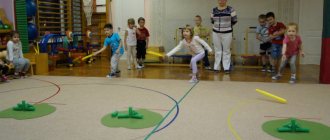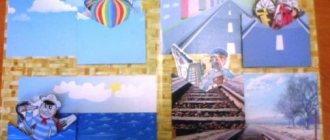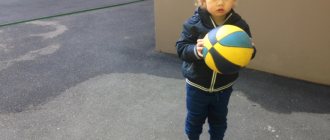Russian folk games are valuable for children from a pedagogical point of view: they pay great attention to developing the mind, character, will, and strengthen the child. Folk games have a lot of humor, competitive fervor, movements are precise and imaginative, often accompanied by unexpected moments, children’s favorite rhymes and barkers.
Modern children move little and play outdoor games less than before due to their attachment to TV and computer games. To maintain children’s interest in folk outdoor games, they must recognize them, and the teacher’s task is to help them with this.
Nurturing selfless love for the Motherland is the main, leading principle of pedagogy. The homeland first appears before the child in images, sounds and colors, in games.
Russian folk barkers before the start of the game
I’m melting, melting, I’m flying into the game, I’m inviting you all, but I won’t tell you which one! I'll tell you the barker. Whoever is late flies into the sky. Tai, Tai, fly in. Have fun and play! We accept everyone into the game and don’t offend anyone. It's time to play Cheerful children Let our laughter sound around Get together in a circle! I invite the kids to a fun game, and whoever we don’t accept, we’ll lift by the ears. The ears will be red. So beautiful before.
In any Russian game there is always a driver or presenter. There are usually many people willing to play this role, but you need to choose one, sometimes two, which is what counting rhymes and tongue twisters are used for.
Children love humorous, funny counting poems and quickly remember them. All participants stand in a circle, in a row, and one of them goes to the middle, loudly. Pronouncing the words clearly, he recites a rhyme, for example:
Club program "Folk Games"
MUNICIPAL BUDGETARY PRESCHOOL EDUCATIONAL INSTITUTION
"KINDERGARTEN "SEVERYANOCHKA" OF A GENERAL DEVELOPMENTAL TYPE WITH PRIORITY
IMPLEMENTING THE PHYSICAL DEVELOPMENT OF CHILDREN"
ACCEPTED: APPROVED:
At the pedagogical council, Head of MBDOU D/S "Severyanochka"
Protocol No._________________________________________________С. V. Zaitseva
CLUB PROGRAM
for children 4 – 7 years old
Implementation period 3 years
Compiled by:
Smychagina O. M. FC instructor of the highest qualification category
MBDOU "SEVERYANOCHKA"
With. Gorki
2014 – 2015 academic year G.
Introduction
Human personality is a harmony of thought and movement. Currently, the formation of a physically healthy, active, harmoniously developed person is of great importance. Particular attention should be paid to outdoor games, since play evokes a great emotional response in children and helps them engage in academic work more painlessly. Games contribute to the proper physical development of the body. Children learn various outdoor games and daily activities with them.
This program is relevant because it participates in solving one of the most urgent tasks of modern education - the formation of a healthy lifestyle for preschool children through specially organized physical activity of the child.
Explanatory note
Everyone knows that children love to play. This desire must be skillfully used in the interests of the children themselves, developing and nurturing in them such necessary qualities as strength and dexterity.
Folk games are part of the patriotic, aesthetic and physical education of children. They develop a stable, interested, respectful attitude towards the culture of their native country, creating an emotionally positive basis for the development of patriotic feelings: love for the Motherland; its culture and heritage. In terms of content, all folk games are classically laconic, expressive and accessible to children.
Game as a means of education
.
The development of outdoor games for educational purposes is associated with people’s lifestyle. The games reflect the characteristics of the mental makeup of nationalities, ideology, education, level of culture and scientific achievements. In addition, some games take on a certain color depending on geographical and climatic conditions.
The health value of outdoor games.
Properly organized outdoor games should have a beneficial effect on the growth, development and strengthening of the musculoskeletal system and muscular system. To develop correct posture in children and adolescents. Outdoor games that involve various large and small muscles of the body in varied, mainly dynamic, work become of great importance.
Card index of games for the formation of a tolerant community of children. Outdoor games of the peoples of Russia.
- Draw an imaginary line in the middle of the room or use an object, such as a rope. Stand on this line. Now say: “Let all the tall ones stand on the right, and the short ones on the left.”
— Ignore the doubts of those children who do not know where to stand.
- Repeat the same procedure, dividing, for example, those who draw well and those who draw poorly.
— Come up with a few more criteria. After this, ask the children to line up by height without words.
The discussion should focus on the idea that it is usually impossible to divide people into two groups on any basis. There are no “highs” and “lows”. It all depends on the situation or on the person who draws the conclusions. Labeling often gets in the way of friendships.
“And I think”...
Goals:
- realize the possibility of coexistence of different opinions;
- realize the value of your own opinion, different from others;
Progress of the game:
Draw an imaginary line in the middle of the room. On one side, hang a plus drawn on paper ("agree"), on the other - a minus ("disagree"). The trait itself means lack of opinion.
Explain to participants that you will be reading statements to them. Those who agree will stand on the “plus” side, and those who disagree will stand on the “minus” side. Participants who cannot decide are placed in the middle, but at the same time they are deprived of the right to speak. Here are examples of statements (the main idea is that statements do not have to be false or true, but rather allow for the possibility of differing opinions. We encourage you to create statements specifically for your group):
— It’s better to play football than to skate.
— Playing “on the computer” is more fun than watching TV.
— Spring is better than autumn.
— The coolest cartoon is “Masha and the Bear.”
— The most beautiful pet is a cat.
Discussion:
Who was right in each case? Was anyone ever right? Is it safe to say that people can have different opinions? Were there any cases when one of the participants found himself in the minority? How did they feel? Did they like it? Did they want to change their minds? How do you treat a person whose opinion you disagree with? Is it good or bad to have your own opinion?
"We need to come to an agreement"
Goals:
- entertain the group;
— concentrate the attention of participants;
- realize the value of cooperation;
- show that efforts must be made to achieve cooperation;
- bring the group together.
Progress of the game: Children are invited to play a very simple game. It is necessary to count to ten, but the whole group must do this. The first participant says “one”, the second says “two”, etc. There is only one problem - if the participants say the number at the same time, the group starts over. During the entire game, any conversations are prohibited. Discussion:
OUTDOOR FOLK GAMES
Option 1.
To play you need a small rubber ball and a lapta - a round stick, 60 cm long, a handle 3 cm thick, a base width of 5-10 cm.
Two lines are drawn on the site at a distance of 20 m. On one side of the site there is a city, and on the other there is a horse.
The game participants are divided into two equal groups. By lot, players of one group go to the city, and the other group leads.
The Citizens start the game. Metala kicks the ball with a rounder, runs across the court beyond the line and returns to the city again.
The “drivers” catch the batted ball and try to mark the runner. They can throw the ball to each other to hit it at a closer distance. If the field players manage to stain the runner, they move to the city.
Otherwise, the players remain where they are. The game continues, the second player scores the ball.
In turn, all players of the hitting party act as metal. But players are not always able to immediately return to the city.
In this case, they expect to be rescued. Only the one who hits the ball far can help out.
It also happens that the one who hit the ball could not immediately run over the line. He waits for the next player to score the ball, then two players run behind the line. A more difficult situation may arise when all but one of the players on the kicking team are behind the line, then the player who has not yet kicked is allowed to hit three times. If he misses, then the city players give up their place to the drivers.
Rules of the game:
Submitters must not cross city limits.
Anyone who cannot score the ball with a rounder is allowed to throw it into the field with his hand.
The city party goes into the field if all the players hit the ball, but no one ran over the line.
Option 2.
A line is drawn at the site. Two of the players stand behind this line.
The serve throws the ball, the returner hits it with a rounder. The rest of the players, standing in different places, catch the ball on the fly.
The one who catches the ball on the fly goes to hit it, and the former hitter goes to the catchers. If no one catches the ball, then the player to whom it fell closest takes it and returns it to the server. If the server catches him on the fly, he becomes the batter, and the server becomes the one who successfully threw the ball to him. The batter goes to the catchers.
Rules of the game:
When serving, when catching a ball thrown to him, do not run beyond his line.
If he does not catch the ball returned to him on the fly, he serves it again. At the beginning of the game, you can set the condition that the game is considered over if one of the players scores 10 points, i.e. He hit the ball 10 times without anyone catching it.
Ukrainian folk game "Dawn"
Target:
To give an idea of the unity of forces in nature - Water, Air, Earth. The Dawn of Nature is the birth of the Spirit of the Earth, which it squeezes out of itself through springs and springs. This Spirit (blue ribbon) - the Air of the Spirit - is the renewing, illuminating forces of Nature, giving inspired strength to man.
Russian folk rhymes
The squirrels were treated to hares and carrots were served. We ate all the nuts ourselves. And they told you to drive! - Stork-stork, stork-bird, What do you dream about at night? I want the swamp edges, - And also? More frogs. You can't catch them, you can't catch them. That's it, you drive! We're going to play. Well, who should start? One, two, three - You start driving! The gnome was looking for gold and lost his cap! He sat down and cried: “What can I do?!” Come out! You should drive!
The one who pronounces the counting rhyme, with each word, and sometimes syllable, touches the players in turn with his hand, not excluding himself. Who gets the last word? He becomes the driver.
If there are many participants in the game. Then we think differently: the children say a counting rhyme, and whoever gets the last word leaves the circle, and the counting rhyme is repeated until only one player remains.
An apple is rolling down a steep mountain. Whoever raises it, leave! A suitcase was floating on the sea, There was a sofa in the suitcase, An elephant was riding on the sofa. If you don't believe it, get out!
Often in games, all participants are divided into 2 teams, and you need to decide which of them will start the game. In this case, two players, one from each team, measure themselves against a stick (“contest”). To do this, we took a stick 40-50 cm long, one of the players takes it by the end, the other, pressing his hand tightly to the hand of his peer, grabs it higher, then the first moves his hand higher than the hand of the second, etc. Whichever player grabs the end of the stick wins the right to start the game on his team.
There is an easier way to select the order - guessing in which hand the object is located? Whoever guesses right gets to start first.
To divide the children into teams equally so that no one would be offended, we used agreements. The players are divided into pairs, step aside and conspire among themselves. It is necessary to negotiate quietly so that the presenters do not hear. Then the children go to the presenters and ask who they choose, often in the form of a rhyme, for example:
Who do you choose: A black horse or a golden collar? Should I roll the balls or drink the water? What will you take: a ruff from a river or a hedgehog from a forest? A gray duck or a wooden pipe? Who will you invite to visit: a mustachioed cockroach or a striped tiger cub?
Collusions are not difficult to form; as they worked, the children began to come up with them themselves. To prevent children from arguing before the game about who should drive or who should start the game, we used lots. The lot can be any stick (paper), which the drawer hides behind his back and says the words: “Whoever draws the lot, let him lead!”





